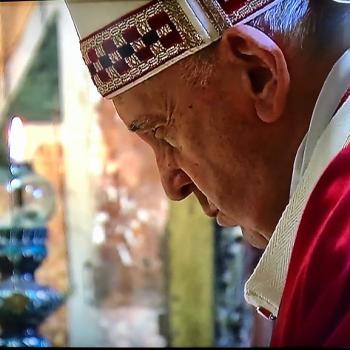Lectionary Reflections
2 Samuel 11:26-12:13a
August 2, 2015
10th Sunday After Pentecost
Most of the time, the choices that the collectors of the Revised Common Lectionary make seem generally thoughtful, not given to forced theological conclusions. I grant that their verse selections at times appear too arbitrary to make much sense — e.g., how could they possibly have us read only Exodus 32:1-14? That is like suggesting that one read only the first half of Moby Dick, thus missing the demise of Ahab on the flukes of the whale! But in today's selection, I think they have gone too far, or rather, not far enough. They would have us read only through the first half of 2 Samuel 12:13, thus concluding our reading with David's confession, "I have sinned against YHWH." This has the effect, I think, of thoroughly short-circuiting the fascinating interchange between prophet and king, and denying us the struggle with the precise reasons for David's confession, the long-term effects of the confession, and Nathan's stern rebuke and surprising, not to say mysterious, forgiveness.
The traumatic story of David's demise is now in full swing. He has slept with Bathsheba, had her husband murdered after failing to hide the affair's progeny, the inconvenient child, and has then calmly attributed the death of Uriah to the fortunes of war, a sort of unpleasant collateral damage (2 Sam. 11:25a). To complete the outrage, David has bid the messenger who has brought news of Uriah's death "to encourage" (2 Sam. 11:25b) the good offices of Joab, the direct killer, the dutiful henchman of the mob boss.
This sordidness continues at the beginning of today's lection. "When the wife of Uriah (note the teller's emphasis on her spousal relationship) heard that her husband was dead, she made lamentation for him (one can imagine that this time of mourning went on not a second beyond the cultural demand, whatever it happened to be at the time). When the mourning was over (it must have been genuinely exhausting to put up this front of tears and wailing since the only goal was further lust with the king), David sent and added her (he hardly went himself to the home of his adulterous partner — too unseemly!) to his house; she became his wife ("untimely to the marriage bed," as Hamlet laments his own father's death and the rushed marriage of his mother to the dead father's brother), and bore him a son" (2 Sam. 11:26-27). Afternoon TV soap opera has nothing on this repulsive tale!
However, though David was Samuel's choice as replacement for Saul, at the behest of YHWH, we are told, and though Samuel claims David to be "a man after God's own heart," all of this monstrousness is apparently too much for that same YHWH. "But the thing the David had done was evil in YHWH's eyes" (2 Sam. 11:27b). Certainly the NRSV's translation that YHWH was "displeased" is so benign as to be laughable! The teller calls the deeds what they are, evil!
And with that direct theological intrusion into the story, rare as it is, the prophet Nathan strides into the throne room with a story of his own to relate to the king. It is in fact one of history's first story sermons. He tells of a poor man who can afford only one tiny ewe lamb, whom he loves to distraction, treating it as if it were his child. Into the poor man's house saunters a very rich man, who has thousands of lambs he might choose to cook for a visitor. But instead of taking one of his flock for the meal, he determines that the poor man's beloved lamb will do nicely as the centerpiece of his feast for the wayfarer. And Nathan waits for King David to react to the tale. David immediately becomes enraged at the rich man's high-handed action. He splutters, "As YHWH lives, the man who has done this deserves death; he shall restore the lamb fourfold, because he did this thing, and because he had no pity!" (2 Sam. 12:6).
David's response to the story is justly famous but rather odd if read with care. He first says that the sentence on the rich man is obviously death, but then demands that the poor man be compensated by the rich man for the loss of his lamb fourfold. Dead men tell no tales, nor can they do the deed of compensation. David, I think, is waffling here, perhaps realizing, a bit late, that the subject of this story is himself. And so it is, as Nathan's very famous reply makes clear: "You are the man" (2 Sam. 12:7), he thunders, and so he certainly is. I admit to finding Nathan's story not quite what I expected. After all, there is nothing poor or the slightest bit pathetic about Uriah, and comparing Bathsheba to a ewe lamb is a bit much. Still, the story works to skewer the king, and that is finally the intent of any story sermon.
Nathan now showers David with a future he would gladly have avoided, but in the end does not. David was YHWH's choice, and could have been a wonderful man as well as a wonderful king, but because of all these shenanigans, killing Uriah and taking his wife, "the sword will never leave your house," your own wives will be publically slept with by your neighbor (in fact, Absalom, your son); you did it in secret, but all this will happen in the daylight, under the searing sun (2 Sam. 12:7-12). David is clearly this man, this killer, this adulterer, this bald-faced liar. And he responds to Nathan's awful diatribe, "I have sinned against YHWH" (2 Sam. 12:13).





